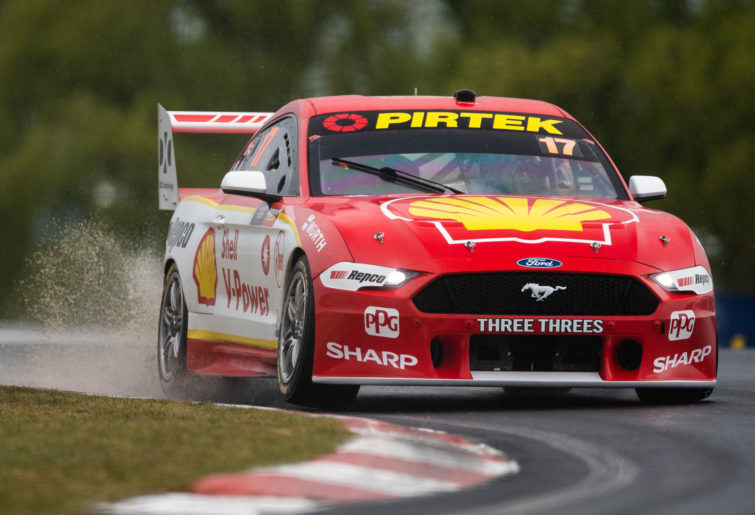'Welcome back': Reliving the last Chinese Grand Prix ahead of its much-anticipated return five years later
Five-years is a long time in motorsport, let alone the general state of the world – especially given the impact of the Covid-19 pandemic…
Opinion
After Scott McLaughlin’s maiden title triumph in a final showdown in Newcastle the year before, Supercars in 2019 was poised to deliver another battle of the heavyweights. However, controversy has left a bitter aftertaste.
The events of the Bathurst 1000 – which saw DJR Team Penske slapped with the biggest fine in Supercars history, a stripping of teams points and further pain to the already wounded #12 entry of Fabian Coulthard and Tony D’Alberto – was the icing on the cake.
The Ford squad tarnished their own efforts for their first victory at the Mountain since 1994. They ordererd Coulthard to slow his car to back up the chasing pack during a crucial safety car period and then ran an illegal engine on McLaughlin’s car during qualifying, in which he claimed pole position.
Those events alone caused a justified furore, with the word cheat being bandied around. The controversy was heightened by the iconic nature of the Bathurst 1000, where victory ensures a place in motorsport folklore alongside heroes such as Craig Lowndes and the late, great Peter Brock.
The negativity of 2019, though, transcends Bathurst – and the foundations were laid after the curtain-raising Adelaide 500, where Red Bull Holden Racing Team owner Roland Dane recited the famous quote “engineering the unfair advantage” in relation to his rivals in blue.
Ford’s debut of the all new Mustang sought to revive the Blue Oval in the Australian touring car championship, following its manufacturer absence since the end of 2014. But this was immediately met with intense negativity from the competition.

(Photo by Daniel Kalisz/Getty Images)
McLaughlin obliterated the field in both 250km races on the streets of Adelaide, with the Shell V-Power team also claiming both pole positions. Immediately there was a question mark over the advantage that the Mustang had, which was perceived to have far superior aerodynamics than its Holden and Nissan equivalents.
This theory was further solidified when at the aero-sensitive Albert Park circuit, the Mustang won each of the four races across the Australian Grand Prix support weekend, with McLaughlin taking three wins and Chaz Mostert for Tickford the fourth.
The first of several aerodynamic adjustments ensued before the third round in Tasmania and continued to take place in between certain rounds, up until the Auckland SuperSprint prior to the Enduro Cup.
Those in the Holden and Nissan camps argued that this was for the good of the sport and to ensure parity, even though a switch to linear springs in between seasons had also caught a few teams offside, chiefly Red Bull. Ford fans were also disappointed, perplexed as to why they were being penalised for simply having a better car within the regulations.
Supercars gave the Mustang the green light before the season started. But after that, multiple changes had to be made to bring Ford in line with the Holden Commodore and Nissan Altima.
If it wasn’t for their faux pas at Bathurst, DJR Team Penske could have been lauded for still possibly winning both the team and drivers championships, while having had their cars neutered throughout the year. That could’ve represented the work of the individual team and their engineering, while McLaughlin’s own record-breaking form catapulted him into the Lowndes, Mark Skaife and Jamie Whincup stratosphere of dominance.
The 26-year old Kiwi secured a second consecutive championship, as well as set a record for most wins in a single season with 18 and achieved the Darwin Triple Crown, which previously had not been done before in Supercars. All while his fellow Mustang drivers languished in his rear-view mirrors.

(Photo by Robert Cianflone/Getty Images)
Since Bathurst, Red Bull were on an unbeaten run and won seven straight races, which included a sweep at the Gold Coast 600 and Sandown 500 enduro events, before championship runner-up Shane van Gisbergen and seven-time champion Whincup split wins in Newcastle.
The rivalry of Holden versus Ford has been the lifeblood of Australian touring cars for several decades and its parochial fans are the essence of that. At the end of another decade, it is pleasing to see this rivalry thriving. But it won’t blossom if one were to pull the plug for example and Ford has only just returned to Supercars as a manufacturer with a new project.
Looking to the future, Supercars has already confirmed that they’re aiming for a 12 per cent reduction in overall aero between the ZB Commodore in Mustang for 2020 in a bid to improve the racing.
Although what does the future beyond 2020 hold for Supercars, with their Gen2 regulations intended to lure new manufacturers, coupé body-types and differing engine specifications.
With the Mustang heavily modified to meet homologation requirements, in the end it stands as no surprise to see the status quo upset. With that the controversies from Supercars’ crown-jewel event at Bathurst, it’s easy to feel dissatisfied after a year that promised the usual greatness.
So in eager anticipation, we await 2020 with parity promised from the outset. A return to the on-track talking between the Holden and Ford rivals should see this year’s bitterness erased.